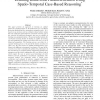ECAI
2000
Springer
15 years 4 months ago
2000
Springer
Case-based reasoning systems solve new problems by retrieving and adapting the solutions to similar previously solved problems. The success and performance of any case-based reason...
80
Voted
MLDM
2001
Springer
15 years 4 months ago
2001
Springer
0 Temporal Abstractions and Case-Based Reasoning for Medical Course Data: Two Prognostic Applications R. Schmidt and R. Gierl University of Rostock, Germany 9.00-9.30 Local Learnin...
85
Voted
MLDM
2001
Springer
15 years 4 months ago
2001
Springer
Abstractions and Case-Based Reasoning for Medical Course Data: Two Prognostic Applications . . . . . . . . . . . . . . . . . 23 R. Schmidt and L. Gierl Are Case-Based Reasoning and...
86
Voted
ICCBR
2001
Springer
15 years 4 months ago
2001
Springer
Case-based reasoning aims to use past experience to solve new problems. A strong requirement for its application is that extensive experience base exists that provides statisticall...
102
Voted
ICCBR
2001
Springer
15 years 4 months ago
2001
Springer
Abstract. Distributed case-based reasoning architectures have the potential to improve the overall performance of case-based reasoning systems. In this paper we describe a collabor...
106
Voted
ICCBR
2001
Springer
15 years 4 months ago
2001
Springer
From some perspectives Automated Collaborative Filtering (ACF) appears quite similar to Case-Based Reasoning (CBR). It works on data organised around users and assets that might be...
101
Voted
ICRA
2002
IEEE
15 years 5 months ago
2002
IEEE
This paper presents an approach to learning an optimal behavioral parameterization in the framework of a Case-Based Reasoning methodology for autonomous navigation tasks. It is ba...
81
Voted
ICCBR
2003
Springer
15 years 5 months ago
2003
Springer
Abstract. This paper describes an innovative usage of Case-Based Reasoning to reduce the high computing cost derived from running large interactive simulation scenarios within the ...
73
Voted
ICCBR
2003
Springer
15 years 5 months ago
2003
Springer
: One of the perceived benefits of Case-Based Reasoning (CBR) is the potential to use retrieved cases to explain predictions. Surprisingly, this aspect of CBR has not been much res...
99
Voted
HICSS
2003
IEEE
15 years 5 months ago
2003
IEEE
Case-based reasoning and multicriteria decision making have common grounds: they are both problem solving methodologies; both involve the selection, ranking and aggregation of bes...

